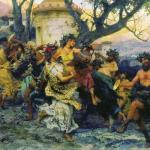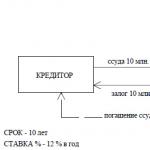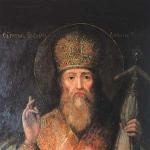Biography. Prince Vsevolod Yaroslavich Mention of the princes in the "Word ..."
Vsevolod Yaroslavich (Grand Duke)
AT sevolod Yaroslavich - son, born in 1030. After the death of his father, as the third in seniority, he sat in Pereyaslavl. In 1073, together with his brother, he drove him out of Kyiv and moved to Chernigov. After the death of Svyatoslav, he occupied the Kyiv table for some time, but then voluntarily gave it up to Izyaslav. The death of Izyaslav again delivered him the grand-ducal table, on which he remained until his death in 1093. His son helped Vsevolod in matters of administration. The chronicler speaks very warmly of Vsevolod, although he reproaches him for preferring his younger squad to the older Kyiv one.
The new encyclopedic dictionary contains the following text of this article. Vsevolod-Andrey Yaroslavich, Grand Duke of Kyiv, favorite son of Yaroslav I, was born in 1030. After the death of his father, he settled in Pereyaslavl-Yuzhny. In 1054, he defeated the Torks across the Sula River, on which he also went in 1060, and in 1061 he himself was defeated by the Polovtsy; in 1067 he participated in the capture of Minsk by the brothers and the defeat of the prince of Polotsk, and the following year, together with his brothers, he was beaten by the Polovtsians on the Alta River. In 1073, Vsevolod helped his brother, Svyatoslav of Chernigov, take away the grand prince's table from the eldest of the brothers, Izyaslav, and after the death of Svyatoslav (1077), he himself occupied Kyiv, but ceded it to Izyaslav, who returned from Poland, from whom he then received Chernigov, from where was expelled a year later. Vsevolod fled to Kyiv; in the same year, with their brother Izyaslav, they gave battle to Oleg on the Nezhatina field, where the Grand Duke fell, and the defeated Oleg fled to Tmutarakan. Vsevolod had already indisputably occupied Kyiv, and planted his son Vladimir in Chernigov. Oleg did not calm down after the defeat: in 1079, having hired the Polovtsy, together with his brother Roman, he approached Pereyaslavl, but the Polovtsy, bribed by Vsevolod, betrayed the brothers: Roman was killed by them, and Oleg was sent to Greece; the Grand Duke sent his posadnik to Tmutarakan. In the last years of his life, Vsevolod did not take an active part in the government and made only orders that were carried out by his famous son Vladimir Monomakh. A devout Christian, a sober and chaste man who knew five foreign languages, but weak as a sovereign, Vsevolod died in 1093. He was married twice: 1) from 1046 to an unknown name (died in 1067), whom the annals call the "Greek princess", "Greekine" and "nun" (according to some, Anna, daughter of Constantine Monomakh); from her he had a son, Vladimir, and a daughter, Janka (Anna); 2) on Anna - according to Miller, Princess of Polovtsy (died in 1111). "The Complete Collection of Russian Chronicles", I, 64, 69, 70, 72 - 75, 78, 85 - 89, 92, 93, 103; II, 266-278; III, 2, 3, 122, 210; IV, 176; V, 136, 138-143, 146-149, 154; VII, 1, 3, 4, 6, 232, 330, 332 - 337, 340 - 342. A.E.
Other interesting biographies:
;
;
;
And the Swedish princess Ingegerda.
After the death of his father, Vsevolod received Pereyaslavl, Rostov, Suzdal, Beloozero and the Volga region. Pereyaslavl was located on the southern border of Russia, and therefore was often raided by nomads - Pechenegs, Torks, Polovtsy, and Vsevolod often had to fight with them.
In 1054, Prince Vsevolod Yaroslavich defeated the Torks and made peace with the Polovtsian prince Bolush.
Vsevolod, together with the brothers Izyaslav and Svyatoslav, was a member of the "triumvirate of the Yaroslavichs" (1054-1073). It was a period of peaceful reign of brothers and close cooperation, Vsevolod was called Prince Pereyaslavsky. They jointly publish Pravda Yaroslavichi (Russkaya Pravda in a new edition). In 1060, the princes together defeated the Torques and expelled them from the Russian lands.
In 1062, Vsevolod opposes the Polovtsy, who attacked Russian land for the first time, but is defeated by their prince Iskal (Sokal). In 1068, the following failure followed in the fight against the Polovtsy: the Yaroslavichi brothers were defeated on the river. Alte, and Vsevolod, together with Izyaslav, fled to Kyiv, and Svyatoslav to Chernigov.
In 1073, Svyatoslav Yaroslavich persuaded Vsevolod to conspire with him against Izyaslav. After the expulsion of Izyaslav, Svyatoslav became the prince of Kyiv, and in 1077, after his death, Vsevolod occupied the throne of Kyiv for the first time, though not for long. Six months later, Izyaslav returned to Kyiv, and Vsevolod, reconciled with his brother, retired to reign in Chernigov.
At that time, Vsevolod's nephew, Oleg Svyatoslavich, deprived of all volosts, lived in Chernigov. He demanded Chernigov for himself, but when he was refused, he fled to Tmutarakan to his cousin Boris Vyacheslavich. Together they, having gathered an army from the Polovtsy, moved to Chernigov. In the battle on Sozhitsa, the Polovtsy defeated the army of Vsevolod. Oleg and Boris occupied Chernigov, and Vsevolod fled to Kyiv.
In the same 1078, Izyaslav and Vsevolod with their sons went on a campaign against Chernigov, and their army won the battle on Nezhatina Niva. In this battle, two princes died - the great Kyiv Izyaslav Yaroslavich and Boris Vyacheslavich.
Vsevolod Yaroslavich, by seniority, occupies the grand-ducal throne, in Chernigov he planted his son Vladimir Monomakh, in Pereyaslavl - the youngest son Rostislav.
In 1079, his nephews, Roman and Oleg Svyatoslavich, together with the Polovtsy moved to Kyiv. But the Polovtsy, bribed by Prince Vsevolod Yaroslavich, killed Roman. In Tmutarakan, Vsevolod imprisoned the posadnik Ratibor, and sent his main opponent, Oleg Svyatoslavich, to prison in Byzantium.
The reign of Vsevolod Yaroslavich was overshadowed by the constant strife of his nephews, who sought volosts, and also fought with each other. Beloved son Vladimir was the main assistant to the prince of Kyiv, Vsevolod handed over to him the conduct of all wars.
In addition to Vladimir, Vsevolod also had a daughter, Janka (Anna), from her first marriage to the Byzantine princess Anna (according to some sources, her name was Anastasia or Maria). The second wife, also Anna, the daughter of the Polovtsian Khan, gave birth to a son, Rostislav, and two daughters (Irina and Evpraksia). Eupraxia was married to Emperor Henry IV, but after a while she fled from Germany to Verona to Pope Urban II, accusing her husband of bullying.
In the last years of his life, Vsevolod did not take part in the government of the country, but only gave orders that were carried out by his son Vladimir Monomakh. Constant conflicts with nephews and wars with nomads undermined the health of the prince, the death of Vsevolod Yaroslavich came in 1093. He was buried in the Kiev Cathedral of St. Sophia.
Vsevolod I Yaroslavich was a very educated person, loved books, knew five languages. For his piety and good nature, he received the nickname "Peaceful".
Rostislav Vladimirovich
After the death of Yaroslav the Wise in 1052, the division of possessions between his sons took place.Initially, the Rostov-Suzdal principality was taken over by Prince Rostislav Vladimirovich.
Rostislav Vladimirovich (baptized Mikhail; 1038? - February 3, 1067) - son of Vladimir Yaroslavich, Prince of Novgorod. N. A. Baumgarten considers the daughter of the Staden Count Leopold Oda to be the prince's mother. Although this version was accepted by some historians, the hypothesis that Oda was the wife of Prince Svyatoslav Yaroslavich is now more common).
Prince of Rostov - 1052 - 1057
After the death of his father (1052), Rostislav was excluded from the number of contenders for the great reign (becoming an outcast).
The first principality ruled by Rostislav was Rostov.
Prince Volynsky - 1057 - 1064
In 1057, after the death of Vyacheslav Yaroslavich and the transfer of Igor Yaroslavich to Smolensk, he received the Vladimir-Volyn principality from his uncles.
Prince Tmutarakansky - 1064 - 1067
Dissatisfied with his position, in 1064 Rostislav left Volhynia and captured Tmutarakan, driving his cousin Gleb Svyatoslavich out of there. In this he was helped by Vyshata and Porey, Novgorod close associates of the deceased father. However, Rostislav's success was short-lived, and when the troops of Gleb's father, Prince Svyatoslav of Chernigov, approached, he left Tmutarakan. But as soon as Svyatoslav's troops left, Rostislav Vladimirovich again drove Gleb out of the city and began to rule in it, collecting tribute from neighboring peoples.
The strengthening of Rostislav worried the Greeks of Chersonesos, and soon Rostislav was poisoned by a sent kotopan (commander).
According to the message of V.N. Tatishchev, at the beginning. 1060s Rostislav married the daughter of the Hungarian king (probably in Lanka, the daughter of King Bela I). Other sources do not confirm or deny this information. From this marriage, Rostislav had three sons: Rurik († 1092) - prince of Przemysl from 1085; Volodar († 1124) - prince of Przemysl from 1092; Vasilko († 1124) - Prince of Terebovl from 1085
Vsevolod Yaroslavich
Vsevolod Yaroslavich is the fourth son of Yaroslav the Wise and Ingegerda of Sweden. Father's favorite son; during his lifetime he had no inheritance and lived in Kyiv with his parents.
Prince Pereyaslavsky - 1054 - 1073
From 1054 to 1073 - Prince of Pereyaslavl (Pereyaslavl-Russian).
Vsevolod I Yaroslavich, a member of the so-called "triumvirate of the Yaroslavichs" (together with his older brothers Izyaslav of Kyiv and Svyatoslav of Chernigov), took an equal part with them in government (the new edition of Russkaya Pravda, campaigns against nomads, the fight against Vseslav Polotsky).
Prince of Rostov-Suzdal - 1057 - 1093
The Rostov-Suzdal land, which in the old days was called Zalesie, at the end of the 11th century turned out to be the lot of Prince Vsevolod I Yaroslavich, who received it in addition to his main Pereyaslav principality (with its center in Pereyaslavl-Russian, the current Pereyaslavl-Khmelnitsky, Kyiv region of Ukraine).
Apparently, the Zalessky possessions of Vsevolod were ruled by princely posadniks; he himself did not visit the Rostov land.
Prince of Chernigov - 1073 - 1078
In the beginning. 1070s the triumvirate broke up: Vsevolod entered into an agreement with Svyatoslav against his elder brother Izyaslav, and he was forced to flee to Europe. Svyatoslav occupied the Kievan table (1073), and Vsevolod, in the course of the redistribution of possessions between them, somewhat expanded his lot.
Grand Duke of Kyiv - 1076 - 1077
In December 1076, Svyatoslav died suddenly. Vsevolod became his heir.
Prince of Chernigov - 1078
Six months later, he returned the throne to Izyaslav, who returned to Kyiv, and he himself received the possession of the late Svyatoslav - Chernigov.
Grand Duke Vsevolod Yaroslavich. Portrait from the Royal Titular. 1672
14th Grand Duke of Kyiv - 1078 - 1093On October 3, 1078, Izyaslav died in the battle on Nezhatina Niva against the exiled princes Oleg Svyatoslavich and Boris Vyacheslavich, and Vsevolod again took the throne of Kyiv, now for the rest of his life. In 1079, Oleg and his brother Roman again moved from Tmutarakan to Kyiv, but Vsevolod bribed the Polovtsy, who killed Roman, and Oleg was sent to Byzantium on the island of Rhodes, where he stayed for another fifteen years; Tmutarakan came under the control of Kyiv.
His reign was overshadowed by Polovtsy raids and constant internecine wars between Vsevolod's nephews and cousins, caused by the imperfection of Yaroslav's inheritance laws. During his reign, the Rostislavichi were especially active - the grandchildren of the eldest son of Yaroslav the Wise, Vladimir, who died during the life of his father, because of which his descendants did not receive any destinies (see outcast) and constantly tried to forcibly capture one or the other city. Vsevolod did not always know how to put an end to these strife and behaved like a weak ruler, who was on the occasion of the younger combatants. However, compared with the large-scale crisis of the 1090s, which began after the death of Vsevolod, his times were still relatively stable, and he deserved the praise of the chronicler in The Tale of Bygone Years, written in the 1110s.
Foreign policy under Vsevolod was marked by intense contacts with the Holy Roman Empire, whose emperor Henry IV the prince married his daughter, Eupraxia-Adelheida, and later with Pope Urban II, Henry's opponent. Probably, the transition of Russia to the camp of the opponents of the emperor was associated with the scandalous conflict between Eupraxia and Henry: Vsevolod's daughter fled from Germany to Verona and appeared before the pope, accusing her husband of bullying her, orgies and participating in satanic rituals.
At the initiative of the prince (apparently, as a result of contacts with Rome), the feast of the transfer of the relics of St. Nicholas of Myra in Bari (“St. Nicholas of the Spring”), unknown to the Greek Church (which has always regarded this transfer as a kidnapping).
Vsevolod Yaroslavich is one of the most educated people of his time. His son, Vladimir Monomakh, writes in his "Instruction" that his father, "sitting at home", spoke five languages. Apparently, among these languages were Swedish (the language of Vsevolod's mother), Greek (the language of his wife), and also, possibly, English (the language of his daughter-in-law, Vladimir's wife, Gita of Saxony) and Polovtsian.
Bishop Peter of Pereyaslavl died in 1082. returned to Russia. The appointment of Ephraim to the See of Pereyaslav by Metropolitan John II of Kyiv and All Russia took place between 1072 and 1089. after the death of Bishop Peter of Pereyaslavl. As the life says, “At that time, the blessed Bishop of Pereyaslavsky Peter died; With the blessing of God and the common decision, and at the wish of the Grand Duke Vsevolod Yaroslavich, our Reverend Father Ephraim was ordained Bishop of Pereyaslavsky by His Grace Metropolitan John of Kyiv. The Pereyaslav diocese (as well as Chernigov) was elevated during this period to the metropolitanate. At the end of the reign of Vsevolod I in the great Kievan principality, a titular metropolis was opened in Pereyaslavl Russky.

Saint Ephraim of Pereyaslav. Icon at the relics of a saint in the Kiev-Pechersk Lavra
Vsevolod I Yaroslavich photo
Father - Yaroslav I Vladimirovich, Grand Duke of Kyiv.
Mother - the wife of Yaroslav, the Swedish princess Ingigerda, baptized Irina.
Vsevolod, the youngest and favorite son of Prince Yaroslav, was born in 1030.
In 1055, his father sent him to reign in Pereyaslavl. Almost from the very beginning of his reign, he faced the raids of the Polovtsy and managed to make peace with their prince, whose name was Bolush. This peace did not last long, and already in the winter of 1061, Vsevolod's troops were defeated by the Polovtsy, who safely fled with loot.
He supported his elder brother Izyaslav, who, according to his father's will, became the Grand Duke of Kyiv. However, in 1073 he succumbed to the persuasion of his other brother, Svyatoslav, helped him win the grand throne and drive Izyaslav out of Kyiv.
After the unexpected death of Svyatoslav at the very end of 1076, he began to rule in Kyiv, but upon his return from exile, his older brother Izyaslav, in 1077, he voluntarily gave him the grand prince's table.
After the tragic death of Izyaslav in one of the internecine battles (in 1078) he became the Grand Duke of Kyiv.
Best of the day
Almost all the years of Vsevolod's reign were overshadowed by internecine wars between various representatives of princely families. Vsevolod did not have enough authority, strength or desire to stop them, although he made such attempts.
The situation was aggravated by the constant raids of the Polovtsy, who plundered on both banks of the Dnieper, even taking several cities (Pesochen on the Supoya River, Perevolok near the mouth of the Vorskla) and never met with rebuff.
In addition, in 1092, a terrible drought hit the country, causing numerous fires, famine and disease. According to the chronicler, only in Kyiv, from November 14, 1092 to February 1, 1093, 7,000 people died. (See: Karamzin N.M. Decree. Works. T. 2. S. 58.)
In the last years of his life, Vsevolod paid less and less attention to the affairs of government. He sent away many of his old advisers and trusted his young favorites; violated the old tradition, ceasing to personally administer court at the princely court in the presence of nobles and people. In the absence of a strong central government, specific princes, princely governors and other officials robbed the common people no less than the Polovtsians.
Judging by the chronicle, Vsevolod was a kind and fair person. They wrote about him that he ruled Kyiv "as a sovereign, having in himself all the virtues, such as: philanthropy, reason, meekness, tenderness and mercy", but at the same time they noticed that the prince, "undergoing incessant anxiety from the Polovtsy, from the Poles and from the disagreement of his own specific princes, he was unhappy. (Historical dictionary of Russian sovereigns, princes, tsars, emperors and empresses. 1793. Reprint reproduction. M., 1990. P. 55.)
However, despite all these excellent qualities, he was an incapable ruler, as N. M. Karamzin wrote, “a devout Christian, philanthropic, sober and chaste from youth itself; in a word, praiseworthy among private people, but weak and consequently vicious in terms of sovereigns". (Karamzin N. M. Decree. Op. T. 2. S. 59.)
Vsevolod died in 1093, bequeathing the principality of Kiev to his son Vladimir Monomakh. He was buried with his father, Prince Yaroslav, in the Kyiv church of St. Sophia.
Wife: Byzantine princess Anna, daughter of Emperor Constantine Monomakh.
Children: Vladimir, Rostislav.
Vsevolod I Yaroslavich
Vsevolod I Yaroslavich (tribe 6). From the genus Rurikovich. Son Yaroslav I the Wise and the Swedish Queen Ingigerda. Born in 1030. Prince Pereyaslavsky in 1054-1073. Prince of Chernigov in 1073-1078 Grand Duke of Kyiv in 1077, 1078-1093
Wives: 1) from 1046 the Greek princess Lipa (according to other sources - Maria) (+ November 1067); 2) Polovtsian princess Anna (+ 7 Oct. 1111).
- Vladimir Monomakh (1053-1125+);
- Eupraxia (1109+), wife of the Emperor of the Roman Empire Henry IV;
- Catherine (1108+);
- Maria;
- Yanka (1112+);
The death of Izyaslav again delivered him the grand-ducal table, on which he remained until his death in 1093, and planted his son Vladimir in Chernigov. Oleg did not calm down after the defeat: in 1079, having hired the Polovtsy, together with his brother Roman, he approached Pereyaslavl, but the Polovtsy, bribed by Vsevolod, betrayed the brothers: Roman was killed by them, and Oleg was sent to Greece; the Grand Duke sent his posadnik to Tmutarakan.
Note
The chronicler speaks very warmly of Vsevolod, although he reproaches him for preferring his younger squad to the older Kyiv one. In the last years of his life, Vsevolod did not take an active part in the government and made only orders that were carried out by his famous son Vladimir Monomakh. A devout Christian, a sober and chaste man who knew five foreign languages, but weak as a sovereign, Vsevolod died in 1093.
material from the site
FROM ANCIENT RUSSIA TO THE RUSSIAN EMPIRE
Read further:
Ratibor(+ 1113), boyar of Prince Vsevolod Yaroslavich.





